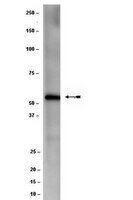Characterization and over-expression of chaperonin t-complex proteins in colorectal cancer.
Coghlin, C, et al.
J. Pathol., 210: 351-7 (2006)
2005
Pokaż streszczenie
The chaperonins are key molecular complexes, which are essential in the folding of proteins to produce stable and functionally competent protein conformations. One member of the chaperonin group of proteins is TCP1 (chaperonin containing t-complex polypeptide 1, or CCT), but little is known about this protein in tumours. In this study, we used comparative proteomic analysis to show that t-complex protein subunits TCP1 beta and TCP1 epsilon are over-expressed in colorectal adenocarcinomas. Monoclonal antibodies to these proteins were developed and the expression and cellular localization of these two proteins in colorectal cancer were analysed by immunohistochemistry on a colorectal cancer tissue microarray. In colorectal cancer, TCP1 beta cellular localization was exclusively cytoplasmic, whereas TCP1 epsilon staining was seen in both the nucleus and the cytoplasm. Both cytoplasmic TCP1 beta and cytoplasmic TCP1 epsilon were significantly over-expressed (p < 0.001 for each protein) in primary colorectal cancer and also showed increased expression with advancing Dukes' stage (p = 0.018 for TCP1 beta and p = 0.045 for TCP1 epsilon). A trend was also identified between over-expression of cytoplasmic TCP1 beta and reduced patient survival (p = 0.05). These results show that both TCP1 beta and TCP1 epsilon are over-expressed in colorectal cancer and indicate a role for TCP1 beta and TCP1 epsilon in colorectal cancer progression. | Immunohistochemistry | 16981251
 |








